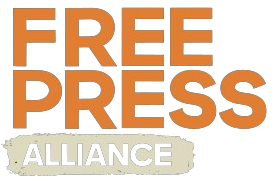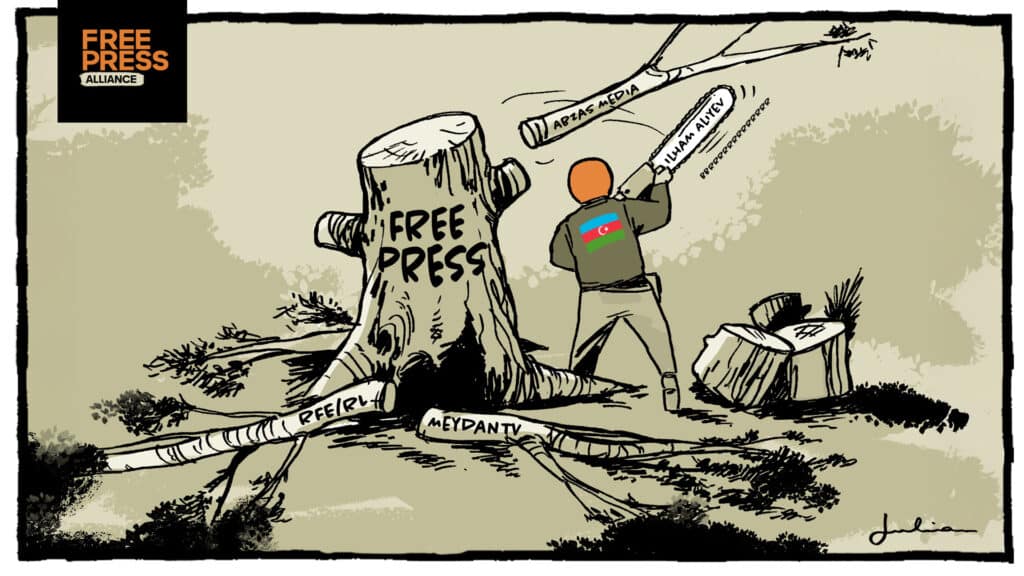A brutal crackdown on independent journalism deepens as authorities jail anti-corruption reporters and peace activists under trumped-up charges.
Azerbaijan has once again confirmed its reputation as one of the most repressive countries for journalists. Ranked 167th out of 180 countries in the World Press Freedom Index by Reporters Without Borders, it is also the 10th worst jailer of journalists globally, according to the Committee to Protect Journalists. President Ilham Aliyev has led a relentless campaign to eliminate dissenting voices, dismantling what little media pluralism once existed. Since 2014, his government has orchestrated a sustained crackdown against independent journalism, culminating in a new and especially brutal wave of repression that began in November 2023.
A silent media landscape
Today, nearly all media in Azerbaijan is state controlled. There is no independent television or radio broadcasting within the country, and all critical newspapers have been shut down. The few remaining independent media outlets, such as Azadliq, Abzas Media, and Meydan TV, have been forced to operate from abroad, regularly facing website blockages and other forms of state censorship.
The government not only silences institutions but also targets individual journalists. The clearest example is the Abzas Media case, where eight journalists were sentenced to prison simply for carrying out investigative work.
The Abzas Media trial: weaponizing financial crimes
Abzas Media is an investigative outlet known for exposing corruption and abuse of power. Its journalists were accused of receiving illegal foreign funding and charged with currency smuggling, money laundering, and tax evasion, claims widely condemned by international rights groups as politically motivated.
The sentences handed down include:
- Ulvi Hasanli (Director), Sevinj Vagifgizi (Editor-in-Chief), Hafiz Babali (Investigative Journalist): 9 years in prison
- Nargiz Absalamova and Elnara Gasimova (Reporters): 8 years each
- Mahammad Kekalov (Project Coordinator): 7½ years
In the same trial, Farid Mehralizada, a journalist with Radio Free Europe/Radio Liberty’s Azerbaijani service, was also sentenced to 9 years. The U.S. funded broadcaster has been labeled by Azerbaijani officials as a vehicle for foreign interference, though no credible evidence has been presented in court.
The case of Bahruz Samadov
Just days after the Abzas Media verdict, a separate court sentenced Bahruz Samadov, a peace activist and columnist, to 15 years in prison for alleged treason. The trial was held behind closed doors, and reports indicate that Samadov had gone on a hunger strike and attempted suicide the week before the verdict was issued. His case has drawn widespread condemnation, seen as part of the government’s broader assault on civic space.
Escalating repression & anti-western rhetoric
Since 2023, at least 21 journalists have been jailed on spurious charges mostly involving the alleged receipt of funds from Western donors. President Aliyev has doubled down on anti-Western rhetoric, accusing NGOs and foreign-funded media of acting as “spies” for embassies from countries such as France, Germany, and the United States.
In early 2025, Azerbaijan threatened to withdraw from key European institutions, including the Council of Europe and the European Court of Human Rights, after its delegation was expelled from the Parliamentary Assembly of the Council of Europe (PACE). This moves signaled Baku’s growing isolation from democratic norms and mechanisms of accountability.
Conclusion: a free press under siege
The convictions of the eight journalists, including long-standing investigative reporters and young newsroom staff, are not isolated incidents but part of a deliberate strategy to criminalize journalism. By labeling anti-corruption reporting as treason or smuggling, the Azerbaijani government aims to dismantle the last vestiges of independent media.
This moment demands strong international action. Condemnation is not enough. Democratic governments, institutions, and civil society must:
- Demand the immediate release of all imprisoned journalists.
- Condition international cooperation and aid in respect for press freedom.
- Provide legal and financial support to exiled and at-risk media.
The world cannot afford to turn a blind eye. In Azerbaijan, journalism has been treated as a crime. The cost of silence will be paid not just by reporters, but by the citizens denied their right to truth.

